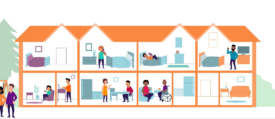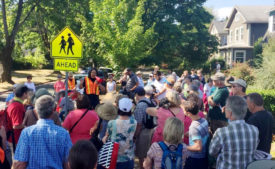Top three shared values:
1. Responsibility
2. Family
3. Legacy
Context: Background on the research
During the spring of 2007, a set of high-level values—ranging from freedom and opportunity to pride and responsibility—were tested among sustainability advocates as well as mainstream audiences in rural and suburban communities in Oregon.
We found that the research findings were relevant beyond Oregon. That’s why Sightline’s communications strategist Anna Fahey, who helped shape the research, is sharing the results in this inaugural issue of Sightline Flashcards.
Details: Top findings from study
- Two top-tier values emerged as the most deeply held and naturally expressed across the four focus groups. These were responsibility and family. A third value, legacy also resonated broadly with focus group participants and consistently triggered a sense of ownership of the future – in particular, activating a sense of personal responsibility to one’s family, the land, and future generations.
- “Responsibility/responsible” rose to the top across all four focus groups. If we had to choose a single frame with which to communicate our values, it would be “responsibility,” in the context of communicating about both citizens and corporations.
- Family was also central. Family—and the words participants use to describe “family” such as “caring” and “support”—should be the foundation for a values communication framework. Family was broadly defined by participants and was an essential component to how they described their identity and quality of life.
- “Legacy” and “heritage” were tested together. “Legacy” emerged as the more actionable of the two and activated a sense of personal ownership of the future. The respondents also connected legacy to the environment, to family, and to future generations. “Heritage” did not resonate as consistently; it was associated with the past.
- Findings suggested that “moral” should be used in conjunction with something else, like “responsibility.” “Moral” was often linked by participants with responsibility and a sense of personal accountability.
- When incorporating values into your communications, think in terms of values leading to desired outcomes. For instance: If we are “responsible,” then we are more likely to pass on as our “legacy” and a good “quality of life” for our kids and grandkids. Participants often made these logical links in their own words.
- Sense of place was also key to identity. Most participants expressed a sense of pride when it came to the place they lived.
Specific findings on responsibility:
- The value “responsible” was volunteered across the four groups as a value or principle participants live by. They used it to describe how they approach their own life, their family, and the environment. “It’s doing the right thing,” as one participant said.
- Responsible / responsibility was the overwhelming top choice for the participants as a means to describe sustainability, conservation, and protecting the environment. It was their most important value.
- The concept was also very related to action; participants commonly used the word to describe what they “must do,” are obligated to do or feel is “right.” When asked what words or phrases best describe “responsible,” respondents were most likely to reply with words that result in taking action. For example, “doing your part,” “lead by example,” “accountability,” “being proactive,” “holding business responsible,” and “being aware.”
- Participants easily visualized “responsibility,” using examples of things they have already done in their own lives – in their yard or home but also in their community.
- Recycling, removing polluting house cleaners and picking up litter are some images that participants volunteer to describe this value. On the corporate front, they use images such as “replanting trees after a clear cut” and “spilling something in the ocean” as examples of what “responsible” is and is not.
- Responsibility is an important value that participants would like to see corporations espouse more often. They volunteered words such as “green corporations” and “corporations” to help describe the word “responsible.”
- They also attached other values mentioned previously to “responsible.” “Caring,” a word many connect prominently with their family is mentioned, as well as “pride,” a value they commonly associate with the place they live.
- Responsible vs. sustainable: Unlike the word “responsible,” which came naturally to participants, the word “sustainable” needed more definition for some who found it too broad or confusing. Participants didn’t make much of a personal connection with this word.
- Stewardship” and “sustainability” were linked to desired outcomes shared by focus group participants, such as a positive “legacy,” a good “quality of life,” or a “healthy” place to live. Making an effort to connect these concepts to “responsible” will underscore how they can lead to desired outcomes.
Specific findings on “family”
- Family was central to the focus group respondents’ identity and quality of life. It was defined broadly and positively through phrases like, “Family is number one.”
- When asked what values they lived their lives by, focus group participants noted quite a few, but first and foremost among these was “family.”
- Family was central to the respondents’ identity and should be the foundation of a values communication framework.
- Some of the strongest emotions in the groups came up when talking about family: “Family is the one thing to die for.”
- Respondents provided relatively similar responses to the question, “What words or phrases best describe family?” Providing mutual support and caring were important aspects of family for participants. In regards to “support,” one man put it this way: “You are a group and you have to live by supporting each other.” Other consistent concepts related to family were love, communication, consistency, education, and understanding.
Specific findings on “legacy”
- Legacy activated ownership of the future. A typical sentiment was: “It’s up to us what we pass on to our kids.”
- Respondents were likely to use words referring to the future to describe “legacy.” (Heritage, on the other hand, conjured images of the past).
- Legacy triggered concepts like stewardship. Respondents wanted the environment they leave behind to be “clean and pretty” and believed we have a “responsibility” to be good “stewards” and pass on a “balanced” environment to the next generation.
- This value was also the most likely to be related to “family.” When discussing this value, participants consistently referred to what they would like to “pass on” or leave behind for their children or the next generation. Many respondents were concerned about what they would pass on to their kids or the next generation more generally. As one woman put it, “You want your children to have the opportunity to have what you had, and to be able to do everything and leave the environment in a good condition for them.”
- More important, participants were fully aware that it is within their collective power to alter their legacy for better or for worse. As one man put it, “We’re going to get a legacy one way or the other. It can be a good one or a bad one. It can be a healthy Oregon, or it could be a sick Oregon.” This links back to “responsibility” and why it is so important to these participants and it is also where “pride” comes in. They want to be proud of what they pass on.










Comments